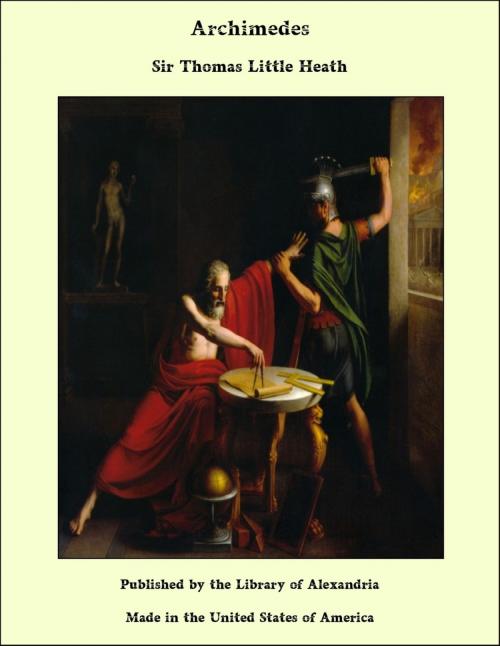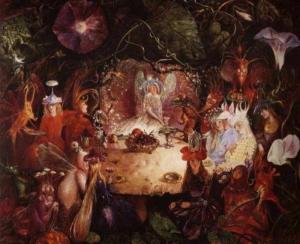| Author: | Sir Thomas Little Heath | ISBN: | 9781465624017 |
| Publisher: | Library of Alexandria | Publication: | March 8, 2015 |
| Imprint: | Language: | English |
| Author: | Sir Thomas Little Heath |
| ISBN: | 9781465624017 |
| Publisher: | Library of Alexandria |
| Publication: | March 8, 2015 |
| Imprint: | |
| Language: | English |
If the ordinary person were asked to say off-hand what he knew of Archimedes, he would probably, at the most, be able to quote one or other of the well-known stories about him: how, after discovering the solution of some problem in the bath, he was so overjoyed that he ran naked to his house, shoutingερηκα, ερηκα (or, as we might say, “I’ve got it, I’ve got it”); or how he said “Give me a place to stand on and I will move the earth”; or again how he was killed, at the capture of Syracuse in the Second Punic War, by a Roman soldier who resented being told to get away from a diagram drawn on the ground which he was studying. And it is to be feared that few who are not experts in the history of mathematics have any acquaintance with the details of the original discoveries in mathematics of the greatest mathematician of antiquity, perhaps the greatest mathematical genius that the world has ever seen. History and tradition know Archimedes almost exclusively as the inventor of a number of ingenious mechanical appliances, things which naturally appeal more to the popular imagination than the subtleties of pure mathematics. Almost all that is told of Archimedes reaches us through the accounts by Polybius and Plutarch of the siege of Syracuse by Marcellus. He perished in the sack of that city in 212 B.C., and, as he was then an old man (perhaps 75 years old), he must have been born about 287 B.C. He was the son of Phidias, an astronomer, and was a friend and kinsman of King Hieron of Syracuse and his son Gelon. He spent some time at Alexandria studying with the successors of Euclid (Euclid who flourished about 300 B.C. was then no longer living). It was doubtless at Alexandria that he made the acquaintance of Conon of Samos, whom he admired as a mathematician and cherished as a friend, as well as of Eratosthenes; to the former, and to the latter during his early period he was in the habit of communicating his discoveries before their publication. It was also probably in Egypt that he invented the water-screw known by his name, the immediate purpose being the drawing of water for irrigating fields. After his return to Syracuse he lived a life entirely devoted to mathematical research. Incidentally he became famous through his clever mechanical inventions. These things were, however, in his case the “diversions of geometry at play,” and he attached no importance to them. In the words of Plutarch, “he possessed so lofty a spirit, so profound a soul, and such a wealth of scientific knowledge that, although these inventions had won for him the renown of more than human sagacity, yet he would not consent to leave behind him any written work on such subjects, but, regarding as ignoble and sordid the business of mechanics and every sort of art which is directed to practical utility, he placed his whole ambition in those speculations in the beauty and subtlety of which there is no admixture of the common needs of life”.
If the ordinary person were asked to say off-hand what he knew of Archimedes, he would probably, at the most, be able to quote one or other of the well-known stories about him: how, after discovering the solution of some problem in the bath, he was so overjoyed that he ran naked to his house, shoutingερηκα, ερηκα (or, as we might say, “I’ve got it, I’ve got it”); or how he said “Give me a place to stand on and I will move the earth”; or again how he was killed, at the capture of Syracuse in the Second Punic War, by a Roman soldier who resented being told to get away from a diagram drawn on the ground which he was studying. And it is to be feared that few who are not experts in the history of mathematics have any acquaintance with the details of the original discoveries in mathematics of the greatest mathematician of antiquity, perhaps the greatest mathematical genius that the world has ever seen. History and tradition know Archimedes almost exclusively as the inventor of a number of ingenious mechanical appliances, things which naturally appeal more to the popular imagination than the subtleties of pure mathematics. Almost all that is told of Archimedes reaches us through the accounts by Polybius and Plutarch of the siege of Syracuse by Marcellus. He perished in the sack of that city in 212 B.C., and, as he was then an old man (perhaps 75 years old), he must have been born about 287 B.C. He was the son of Phidias, an astronomer, and was a friend and kinsman of King Hieron of Syracuse and his son Gelon. He spent some time at Alexandria studying with the successors of Euclid (Euclid who flourished about 300 B.C. was then no longer living). It was doubtless at Alexandria that he made the acquaintance of Conon of Samos, whom he admired as a mathematician and cherished as a friend, as well as of Eratosthenes; to the former, and to the latter during his early period he was in the habit of communicating his discoveries before their publication. It was also probably in Egypt that he invented the water-screw known by his name, the immediate purpose being the drawing of water for irrigating fields. After his return to Syracuse he lived a life entirely devoted to mathematical research. Incidentally he became famous through his clever mechanical inventions. These things were, however, in his case the “diversions of geometry at play,” and he attached no importance to them. In the words of Plutarch, “he possessed so lofty a spirit, so profound a soul, and such a wealth of scientific knowledge that, although these inventions had won for him the renown of more than human sagacity, yet he would not consent to leave behind him any written work on such subjects, but, regarding as ignoble and sordid the business of mechanics and every sort of art which is directed to practical utility, he placed his whole ambition in those speculations in the beauty and subtlety of which there is no admixture of the common needs of life”.















